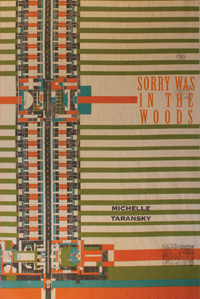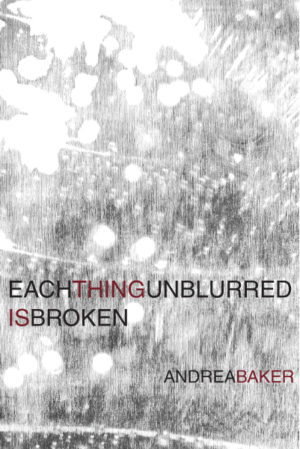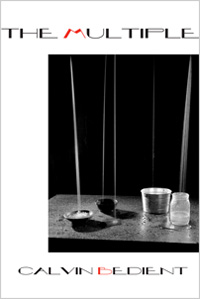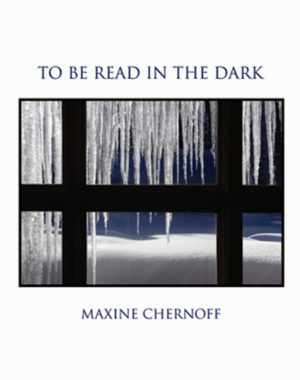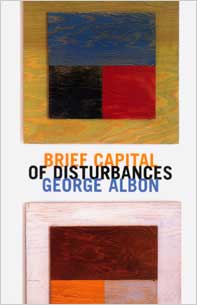Description
In a woods where bodger and cabinet maker are at work, Michelle Taransky’s second collection of poems, Sorry Was In The Woods is that landscape where perspective is not singular, where waiting, worrying, watching, and recording are able to both arrange and derange our understanding of place. Taransky’s subject matter suggests our pressing need to face directly into the reality of each moment, and to question what it means to be moral in this troubled world of ecological and cultural calamity. Yet her surprising language use and references will invite her readers to walk with her through the forest of Yeats’ and Howe’s Seven Woods, and to feel the presence of Bob Perelman’s leaves, Zukofsky’s bough, Olson’s hand, and Gertrude Stein’s tree. In these compelling poems, a reader will find many familiar images and figures, and yet sense how the forest of event is always just beyond our capacity to describe or understand it. A sense of fear and wonder at our circumstance is one of Taransky’s great gifts to us, one of her finest achievements.
One of The Volta‘s Best Books of 2013
Taransky’s spare, remarkably surefooted poems are propelled by an urgent and luminescent perseverance in the face of finding one’s way, step-by-step in these dark times. “Building the woods/ Is the last workaround/ How to define an approach / after an approach/ That changes” Her willingness to go further then most dare—formally, conceptually— marks hers as voice to listen for in the wilderness.
Susan Howe, author of That This
Who knows what lyric lurks in word’s woods? Michelle Taransky’s elusively alluring poems make a path. They beckon. Listen.
Charles Bernstein, author of All the Whiskey in Heaven: Selected Poems
An old and deeply human realization can be found at continuous work in Michelle Taransky’s Sorry was in the Woods: she knows a poet is a maker, and a poem a made thing. With a sincerity that does not abandon wit, Taransky gives us poems of the woods—that place of bewilderment, yes, but more importantly here, that place in which amazement goes to work, finds that the woods are home to prophets and profits, and the tree’s beauty is also how it succumbs to the tool. It just happens to be that the primary tool is this poet’s mind, searching through memory and vision for an ethic that will suffice. That ethic promises that the made thing also honors that which it is made of—paper made from wood, but also that technology of the poet’s mind which given wood, carves word. Taransky writes from a ground that hovers inexactly between allegory and actuality, refusing to let those differing worlds tear themselveswholly apart. What stitches them together? Exactly these poems, filled not with plans, but with “the plans caution,” written by exactly this poet, whose poems are careful because they originate in a mind filled with care.
Dan Beachy-Quick, author of Circle’s Apprentice
About the Author
Reviews
Excerpt
A graduate of The University of Chicago and The Iowa Writers Workshop, Taransky lives in Philadelphia and is a member of the Critical Writing Faculty at University of Pennsylvania. She is Reviews Editor for Jacket2 and a regular guest on the poetry podcast series, “PoemTalk,” a collaboration between Kelly Writers House and The Poetry Foundation. Taransky has also taught writing at University of Iowa, Rutgers University in Camden, and Temple University, and worked as an arts administrator at literary arts organizations including The Poetry Center of Chicago, The International Writing Program, The Kelly Writers House at University of Pennsylvania, and Flying Object in South Hadley, MA. Since 2007, Taransky and Emily Pettit have coordinated the Whenever We Feel Like It reading series, which is archived on PennSound. Taransky’s poems have been anthologized in The Arcadia Project: North American Postmodern Pastoral (Ahsahta Press 2012), Translating and Rewriting Shakespeare (Nightboat/Telephone 2012), Disco Prairie Social Aid and Pleasure Club (Factory Hollow, 2010) and The City Visible: Chicago Poetry For The New Century (Cracked Slab, 2007). With her father, architect and artist Richard Taransky, she co-authored the chapbook The Plans Caution, published by QUEUE books. Brave Men Press published No, I Will Be In The Woods in 2011.
A brief interview with Michelle Taransky
(conducted by Rusty Morrison)
How/why did you begin Sorry Was In The Woods? What initiated the work?
After Barn Burned, Then I was looking for a new landscape. Finding the woods presented a place to look for through the windows, and also, a new set of particulars (instead of the barn, the farm, the teller or the robber) to recognize in the world. The woods became a way to organize the days by marking the trees I encountered. Writing these poems offered me a way to “think with” and “think through” the experience of wood workers as well as the wood being worked on. I’ve never made a chair from a tree I felled myself, but I don’t feel as dissimilar from the work of a cabinet maker as I did before beginning the project.
How did you come to choose the title of this book?
The title drops off the “I” expected in “Sorry, I Was In the Woods” to question who, or what, should be blamed. “Sorry Was In The Woods” suggests Sorry as a character, suggests being sorry or feeling sorry as a part of being in the woods, suggests an effort to work without the perspective of the “I” or my “I” as anchor.
The epigraphs in this text suggest a strong affiliation with these writers. Can you speak to your choices for these quotations?
Choosing these quotations from among the quotations that carried me through this work, from the numerous imagined conversations with the ghosts of writers who wrote of woods and woodworkers including woodsmen, bodgers, cabinet makers and carpenters I had never met, meant leaving implied those quotations not included. But I think that’s something I discovered while writing Sorry Was In The Woods: there will be times when you do have to choose one tree from among the woods.
Who are the authors with whom you feel a kinship with now? &/or Who are you reading currently?
Susan Howe, Myung Mi Kim, William Carlos Williams, Charles Bernstein, Charles Olson, George Oppen, Gertrude Stein, Bob Perelman, CA Conrad, Dan Beachy-Quick, Srikanth Reddy, Emily Pettit, Caryl Pagel, Jordan Stempleman, Paul Legault, Mark Nowak, Normal Finkelstein, Charles Alexander and Brian Teare.
Would you tell me about yourself, your history, your interests?
I’m a graduate of The University of Chicago and The Iowa Writers Workshop. My first book, Barn Burned, Then was selected by Marjorie Welish for the 2008 Omnidawn Poetry Prize. With my father, architect and artist Richard Taransky, I co-authored the chapbook The Plans Caution, published by QUEUE books. Also, Brave Men Press published my second chapbook, No, I Will Be In The Woods, in 2011. Currently, I live in Philadelphia and I’m a Critical Writing Fellow at University of Pennsylvania, where I teach writing. I’m also Reviews Editor for Jacket2 and a regular guest on the poetry podcast series, “PoemTalk,” a collaboration between Kelly Writers House and The Poetry Foundation. I’ve also taught writing at University of Iowa, Rutgers University in Camden, and Temple University, and worked as an arts administrator at literary arts organizations including The Poetry Center of Chicago, The International Writing Program at University of Iowa, The Kelly Writers House at University of Pennsylvania, and Flying Object in South Hadley, MA. Since 2007, Emily Pettit and I have coordinated the Whenever We Feel Like It reading series, which is archived on PennSound.
Your father’s artwork is the primary image for the cover design for this book. And, a number of his line drawings are in the book. Can you speak to these wonderful pieces of art and their relationship to your writing in this text?
Before I knew about the process of writing poems, I knew the ways my father would make a drawing. He always had a studio at our house, and I could watch the piece pinned up on the easel be worked on and worked over. Passing days brought new figures, new relationships, and a new structure to be seen. Other days, a face I’d seen earlier may be lost, a horizon removed, a city now transformed into a single building.
Watching my father make work and watching my father work through ideas in his drawings gave me a set of procedures upon which to begin my practice of writing poems.
Charged by their contradiction, Taransky’s woods are a place of concealment and revelation, a place where “we have a machine / We cannot explain.” And hauntingly, they are the same place that allows her to arrive at the words she is seeking as she moves through them: “I am looking for a language / With a word that means / We must see it all / Differently.” As her poems begin to grow in length and urgency, Taransky brings readers to a place of absence, demonstrating the effects of deforestation and the demand for fuel upon a community who knows “war increases their / Need for wood.”
Relentlessly curious and demanding of the world she lives in, Taransky shows us that if we are to begin figuring out anything – a desire even she’s not entirely sold on – we must begin anew by looking back, but looking back differently. Sure, we must reinvigorate our language to move forward to fulfill the elusive ideal we hope for, but what does it mean to take an entirely new idiom to re-enter and re-examine the past? In many ways, this seems Taransky’s most fascinating experiment.
“To be as shaped as wood can be when a man has had his hand to it.” In other words, to be as altered from itself while mainting the limitations of its material circumstance, and this also resonates in the body of the poems themselves. At times, they’re so tight that one wonders if they could accommodate an additional splinter or fiber of pulp, while at others, they seem as expansive as the woods themselves.
In Taransky’s ragged and raw lines, I recognize the figure of our current environmental crisis, the ever-expanding disconnection we perceive between humans and our idealized “nature.” In Sorry Was in the Woods, Michelle Taransky offers us if not a map, then a way to practice navigating this seemingly fallen landscape.
I obsessed about the pun in the title (can I call it a Lyrical Ballads-style juxtaposition?) which is to say: sorry, I was in the woods, gone fishing, out seeking inspiration, out surrounded by nature; but also, sorry was in the woods, sympathy was in the woods, apology was out in the woods, that’s where I found it. There’s a play on woods/would, too, a pun that’s reminiscent of Liz Waldner’s Dark Would (the Missing Person), so: efficacy, agency, desire, if only. Unromantic Romanticisms.
Accompanied by artwork (including on the cover) by her father, the artist Richard Taransky, the poems in Sorry Was In The Woods echo off each other, repeat without being repetitive, connecting as a forest would, growing in and up, around each other, impossible to separate. Part of this is seen in the thread of poems that run through the entire book, each titled “THE PLANS CAUTION,” writing “Was should, was a foundling was the truth was it found as they found it to hold their gaze in place of a sanctuary,” to “Too many trees wanting to be like bodies” to “Won’t be examples or failures, won’t be / Where when we finish them [.]” Shifting between the perspective of the forest and who might be lost within, the poems map out an increasingly large canvas, a collage of perspectives confusing and conflicting at times, and even disappearing in the darkness of the trees.
These poems illustrate a search for significance, in understanding one’s self as apart from the rest, a tree isolated from the rest of the forest. The speakers catalog the history of carpenters, the same construction throughout history, to understand where and what they are now … But there is a fear in possibly understanding that a man is a Man and a tree is a Tree, the same forever and forever.
WHEN THE WOODS IS WHERE
We came out here
to figure out figuring
out— Which woods took
what tree from the bodger
made symptoms
into a sentence
to harbor your feverfew
ideas about chances
and their damage
when it comes to
Your father preaching at the timber beasts.
After figuring it all out
before admitting you were
told about the working conditions
outside the window— That its cracks
were, as well, the people you see
they look like a wolf. A mistake
to say you are a history
a more current idea
concerning how to move
from the city
center. We figure
out the way to conquer
by conquering. That
the lumberman is a lumberman
instead of a logger
is written in the manual
if only you were
looking, for excuses
not to change directions

